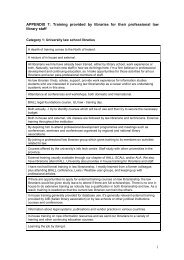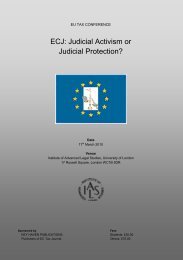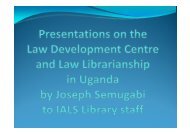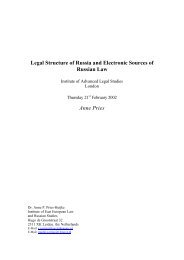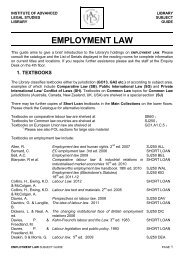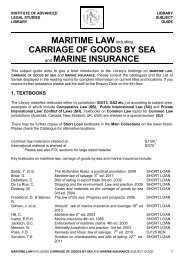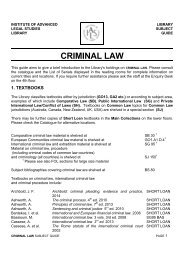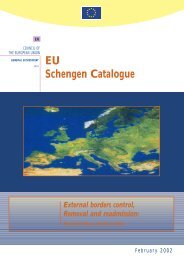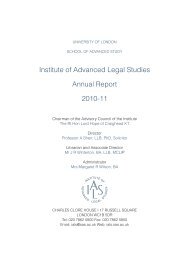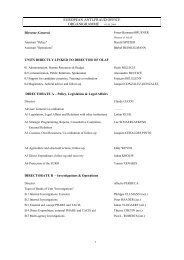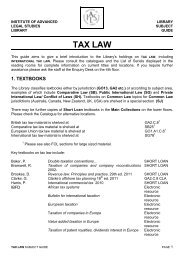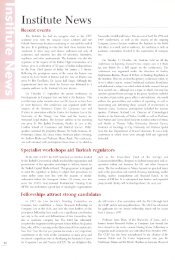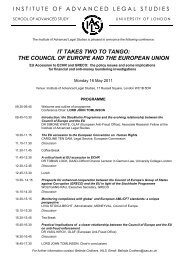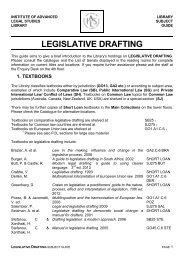a thesis - Institute of Advanced Legal Studies
a thesis - Institute of Advanced Legal Studies
a thesis - Institute of Advanced Legal Studies
You also want an ePaper? Increase the reach of your titles
YUMPU automatically turns print PDFs into web optimized ePapers that Google loves.
100 IMPLIED TRUSTS.<br />
the father is not put on the legal liability to maintain, but on the<br />
moral obligation. But, as Mr. Underbill says (6th ed. 126),<br />
" Surely there is as much moral presumption <strong>of</strong> an intention by a<br />
mother to benefit her <strong>of</strong>fspring as there is in the case <strong>of</strong> the father<br />
.... in reason and in custom there is assuredly as much obligation<br />
on the part <strong>of</strong> a mother, who has the command <strong>of</strong> money, to<br />
benefit her children with it as in the case <strong>of</strong> a father." In such<br />
cases, however, Sir George Jessel admits that, even if the mother is<br />
not in loco parentis, very little evidence beyond the relationship is<br />
wanted, there being very little motive required to induce a mother<br />
to make a gift to her child, so that the point is not <strong>of</strong> great<br />
importance. (See also In re Or me (1884), 50 L. T. 51.)<br />
The trust or advancement in these cases being founded on the<br />
presumed intention <strong>of</strong> the parties, verbal evidence is admissible—<br />
Firsf, to prove by whom the purchase-money is paid (Gascoigne<br />
v. Timing (1685), 1 Yern. 366; Knight v. Pechey (1759), 1 Dick.<br />
327; see also Ryall v. Ryall (1739), 1 Atk. 59; Willis v. Willix<br />
(1740), 2 Atk. 71; and Groves v. Groves (1829), 3 Y. & J. 163) ;<br />
Secondly, to prove the intention with which the transfer is<br />
made in order to rebut the presumption <strong>of</strong> a resulting trust (Dyer<br />
v. Dyer (1788), 2 Cox, 92; Rider v. ffidder (1805), 10 Ves. 364;<br />
and Fowkes v. Pascoe (1875), L. E. 10 Ch. App. 343) ;<br />
Thirdly, to rebut the presumption <strong>of</strong> advancement ( Williams v.<br />
Williams (1863), 32 Beav. 370); and<br />
Fourthly, to support the presumption <strong>of</strong> advancement (Lamplugh<br />
v. Lamplugh (1709), 1 P. Wms. 113).<br />
A resulting trust will not, however, arise under the rule stated<br />
in Dyer v. Dyer if the policy <strong>of</strong> an act <strong>of</strong> parliament would be<br />
thereby defeated. (Ex parte Tallop (1808), 15 Yes. at p. 71.) For<br />
instance, there will be no resulting trust in favour <strong>of</strong> a purchaser<br />
who buys land in order to qualify the transferee to act as a justice<br />
<strong>of</strong> the peace (Crichton v. Crichton (1894), 13 E. 770), for this<br />
would be to defeat the statute 18 Greo. II. c. 20, which requires<br />
that the ownership shall be a beneficial one. And it may be that<br />
this principle goes further, and that there will be no resulting trust<br />
where the property has been bought for any illegal purpose. The<br />
decision in Groves v. Groves (1829, 3 Y. & J. 163) appears to have<br />
been partly based on this ground.



